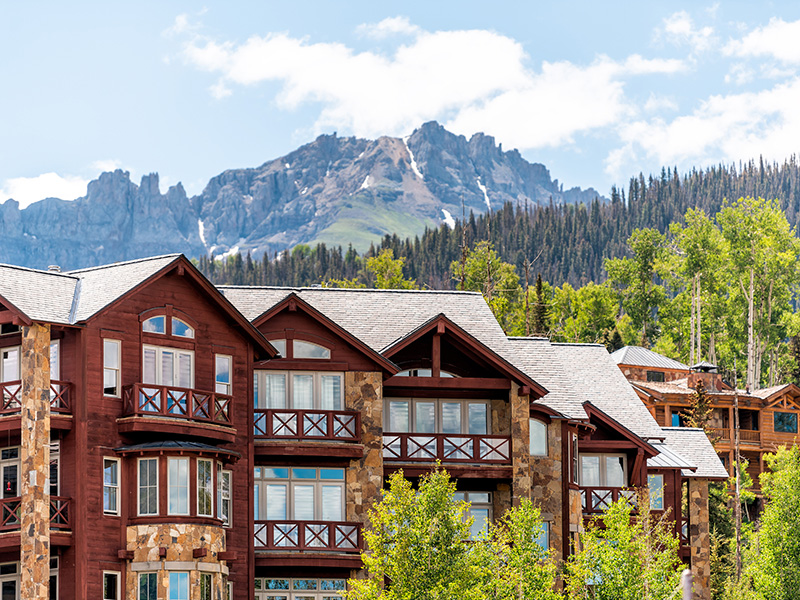
Are you currently in the market for condos for sale in Telluride? If so, there are a few essential things you need to know before you take the next steps.
When starting your search, it’s important to keep in mind that your new home may be governed by a condominium owners association. It’s a legal organization of homeowners working together to maintain the quality of life and property values of the development.
On this page, we’ll provide extensive information on condo associations including how they operate, their responsibilities, and what you should expect when living in a Telluride condo development managed by one.
WHAT IS A CONDOMINIUM OWNERS ASSOCIATION?

Condo associations are formed by a board of directors. It consists of current residents within the community, all of whom are tasked to enforce the community’s covenants, conditions, and restrictions (CC&Rs) and oversee day-to-day business operations.
Some of the key responsibilities of a condo association include:
- Maintaining and repairing common elements and areas within the condo development
- Assessing changes to the exterior proposed by homeowners
- Adopting budgets
- Preserving association records
- Organizing events and activities
- Collecting assessments
- Enforcing covenants
Condo association boards have the authority to engage in the services of outside parties such as contractors, property management companies, or legal counsel to fulfill their obligations.
Who regulates condo associations in Telluride?
All condominium owners associations, homeowners associations, and common interest communities in Telluride are governed by the Colorado Common Interest Ownership Act (CCIOA). The rights of unit owners and the responsibilities of the condo association are defined under the CCIOA, which provides for the enforcement of those rights and responsibilities through civil litigation.
The state of Colorado, however, has no authority to interfere in conflicts between members and their associations. The state also has no jurisdiction to enforce the rights and responsibilities defined in the CCIOA. Since there is no regulatory oversight of condo associations or community association managers in Colorado, any dispute between homeowners and condo associations is considered a civil matter.
Difference between condo associations and homeowners associations
The main difference between a condo association and a homeowners association is the scope of ownership. They’re virtually the same, with the exception of condo associations representing “units” rather than detached homes. These units may include condos, townhomes, apartments, or a combination of all three.
In a condo, members own their unit and have a shared ownership interest in some common areas within the development, such as the lobby and other amenities. All condo residents are members of their condo association and share an ownership stake in the elements owned by the association. Members of condo associations are encouraged to contribute to running the association. In some larger developments, a board of directors is elected to handle community operations, including all of the duties and responsibilities it entails.
Homeowners associations (HOAs) are typically associated with single-family residential homes, with members owning individual properties and the lots they’re situated on. Community amenities and shared spaces, however, are owned by the HOA itself, which means residents do not have a joint ownership interest in these common areas. An HOA can either be a fully independent entity or owned by the neighborhood’s property developer. It also has the responsibility of maintaining all common areas on behalf of all owners residing within the neighborhood.
Hiring a professional management company
Managing a condo association takes a lot of work to keep it operating smoothly, but most condo association board members are volunteers who do not gain any form of compensation. For this reason, some boards choose to hire a professional management company to assist in handling responsibilities.
Property managers work alongside the board of directors, assisting in various daily operations such as contract negotiation, maintenance coordination, and dues collection. Delegating key responsibilities to a reliable management company allows for an efficient and successful operation of a condo association.
Dues
When buying a condo in Telluride, remember that membership to the condo development’s association is mandatory. As part of the condo association, you are required to abide by the community’s CC&Rs and pay all necessary dues established within them.
Dues collected by a condo association are used for a variety of things. In neighborhoods, the homeowners association is responsible for the maintenance, repair, and replacement of common elements, which are abundant in most condo developments. These common elements include elevators, hallways, lobbies, sidewalks, and amenities like fitness rooms and swimming pools. The collected dues also cover insurance, accounting, legal, and management fees for the condo.
Responsibilities of owners
Condo unit owners are responsible for their units according to terms defined in their association’s CC&Rs. In general, a unit is defined as the “interior of the concrete slab upward and the exterior surface of the drywall,” although this varies from condo association to condo association.
All elements contained within the boundaries of a unit as defined in the CC&Rs fall under the responsibility of the owner. Most associations also require these elements to be fully insured.
BENEFITS OF LIVING IN AN ASSOCIATION-RUN CONDO DEVELOPMENT
Many prospective buyers prioritize association-run Telluride condos for sale due to the multitude of advantages they offer to homeowners. When a condo association is well-run, condo owners can look forward to living in a thriving community.
Below are some of the many benefits that come with being a resident in an association-run Telluride condo development.
Stability
Many Telluride condo buyers seek developments that offer a specific quality of life. With an efficient and reliable condo association, condo owners have the assurance that property values will remain high and the community will maintain the quality that attracted them to the development in the first place.
Top-quality amenities and services
Condos for sale in Telluride offer a wide range of amenities designed to offer an unparalleled lifestyle. Whether your condo is equipped with amenities like ski storage, a fitness center, or a heated swimming pool, the condo association will make sure all of these community resources stay in excellent condition.
Additionally, condo residents can count on consistent, quality professional services that may otherwise be unavailable or too costly for property owners outside of the development. For a monthly fee, you won’t need to deal with the hassle of coordinating with local service providers to address maintenance-related issues.
Community mindset
With an active condo owners association, residents enjoy the sense of involvement and collective efforts in making the development an excellent place to call home.
A condo association is composed of other residents in your community, which means there are many opportunities to contribute to maintaining the development’s standard of living. Condo residents can experience an exceptional quality of life thanks to a well-run board that shares a common goal and prioritizes the needs of the community.
Standards of compliance
Association-run condo developments set guidelines that all residents need to comply. For example, many condo associations in Telluride do not tolerate unruly behavior– you won’t need to worry about noise from late-night parties next door.
Your association is there to mediate disputes between community members and implement consequences for violating established guidelines.
WORKING HARMONIOUSLY WITH YOUR CONDO ASSOCIATION

A maintenance-free lifestyle is one of the biggest benefits that attract many people to condo living. Before browsing condos for sale in Telluride, however, it’s important not to assume that everything that lies outside your unit will be handled accordingly.
Be sure to gather information ahead of time about how a condo association operates and what you can expect as a condo owner. Here are several simple tips to ensure a smooth and harmonious relationship with your future condo association.
Take time to research
Make sure you thoroughly read and understand governing documents and all rules, bylaws, and regulations established by the condo association. Familiarize yourself with state, local, and federal laws that impact condo associations by visiting the Colorado HOA Information and Resource Center’s website.
Gather information on the condo association
A condo owners association is essentially a hyper-local government for the community. looking into the people running it and how well they function as a team is always a smart move.
Condo associations are typically overseen by residents elected by association members. But as mentioned earlier, some are managed by professional property managers. Take this approach when you’re gathering information on a development managed by a private company:
- Investigate its reputation – Find out if the association hires employees or services to perform certain functions, and ask about these entities and the type of work they do.
- Schedule a meeting with the property manager – Speaking with the person in charge will help you understand whether you can trust this individual to make important decisions on your behalf regarding the development. If you’re interested in serving on the board one day, this conversation will also tell you whether it’s a worthy undertaking.
- Talk to current residents – If you can, try to initiate a conversation with a resident who has lived there for several years and is not part of the association’s board. Ask them important questions like whether disputes are handled in a civil manner, and if they believe the association is functioning as it should.
Stay involved
Attend condo association meetings to stay informed on current issues, find out how they’re operating, and get a closer look at how funds are being managed.
Keep in mind that the condo’s directors are residents like you. It’s just that they are elected as the association’s main decision-making body, duty-bound to uphold and enact the condo’s CC&Rs. To ensure proper representation, take an active interest in the association, participate in annual meetings, and vote during the board election. Furthermore, you can join committees created by your condo association.
Pay your assessment fees in a timely manner
Failure to pay assessment fees on time can result in delayed services or maintenance. Moreover, you will be essentially impeding the efforts and progress you would like to see in your condo development.
Condo associations operate on an annual budget funded by assessment fees collected from all condo owners. The annual budget is used to fund a condo’s general maintenance, renovation and improvement projects, and daily operations of the association. In addition, non-payment of your assessment fees can cause the condo association to initiate collection activities that require additional administrative and legal costs.
RESOLVING DISPUTES WITH YOUR CONDO ASSOCIATION
Problems that arise between condo units and the association are unavoidable at times. Disagreements with how dues are being utilized, concerns about increases in assessments, and grievances about the management company are some of the many issues that can escalate, especially if the unit owner, manager, or board member fails to communicate in an appropriate and timely manner.
Below are a few helpful tips on how to resolve disputes peacefully with your condo association
Get perspective
The first step is to distance yourself from the problem. Then, try to take a look at it from different angles. Seeing the problem from all perspectives can give insight into how it may be resolved in a manner that satisfies every party involved.
Write down your grievances
In case things get a little heated, submitting a letter to your condo association might be the best approach.
Mention all of your grievances and your motivations while offering solutions if you can. Writing everything down is a great way to articulate your thoughts, which could be a step forward as you attempt to resolve problems between you and your condo association.
Research state laws
You might be surprised how easily some things change if you know your rights as a condo owner. Sometimes, even members of your condo association aren’t familiar with them either.
If you discover any actions that are in conflict with bylaws or state laws, use it to your advantage. Violations may even be taken to court. Laws covering such matters are in place to stop abusive condo associations, so remember to take time to research.
Appeal
All decisions made by condo associations are open to appeal. Remember to use facts to make a rational appeal.
Do not withhold necessary fees during the appeal process to avoid incurring penalties. Even if you don’t agree with a certain fee, the best course of action is to pay it if you can or negotiate to pay less for now in case you’re unable to afford it.
Deal with violations responsibly
In case you happen to violate any rule or regulation by accident, it can be highly disappointing to learn about it through a written letter with an attached fine.
The first step is to admit your mistake. Explain that you didn’t violate the rule intentionally and would’ve been happy to correct your mistake had someone talked to you about it first instead of sending a notice. In some cases, the association may provide a compromise, or even drop the fine entirely.
Dispute resolution
If you need to file a complaint against your condo owners association, visit the Colorado Division of Real Estate website to submit your complaint. An officer will get in touch with you to discuss your complaint in case additional information or clarification is required. They will also provide you with several resources who may be able to assist.
Another option is to go to the Colorado Judicial Branch Office of Dispute Resolution website to get access to qualified mediators and professionals who specialize in handling situations related to common interest communities. Assuming your condo association is open to the motion, considering alternative dispute resolution can often eliminate the need for litigation.
CHOOSE FROM THE FINEST LUXURY CONDOS FOR SALE IN TELLURIDE TODAY
If you’re in the market for the best luxury condos for sale in Telluride, Team TD Smith is ready to go above and beyond to help you fulfill your real estate goals in this sought-after community. You can count on our Mountains of Experience and unmatched expertise to ensure a smooth and stress-free transaction from start to finish.
Give us a call at +1 970.729.1577 or send an email.


